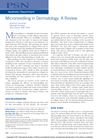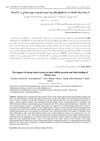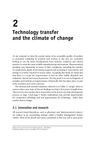 6 citations,
July 2017 in “Plastic surgical nursing : official journal of the American Society of Plastic and Reconstructive Surgical Nurses”
6 citations,
July 2017 in “Plastic surgical nursing : official journal of the American Society of Plastic and Reconstructive Surgical Nurses” Microneedling is effective for skin rejuvenation and various skin issues, but more research is needed to confirm its safety and effectiveness.
 6 citations,
November 2007 in “British Journal of Dermatology”
6 citations,
November 2007 in “British Journal of Dermatology” Fulvestrant solution doesn't help hair loss in men and postmenopausal women.
 5 citations,
January 2017 in “Journal of Nanomedicine & Nanotechnology”
5 citations,
January 2017 in “Journal of Nanomedicine & Nanotechnology” Nanoemulgel could be a promising new treatment for hair loss.
 4 citations,
September 2011 in “Expert Review of Dermatology”
4 citations,
September 2011 in “Expert Review of Dermatology” Various treatments exist for alopecia areata, but none are completely satisfactory; choice depends on age, disease extent, and preference.
 3 citations,
April 2022 in “Clinical, Cosmetic and Investigational Dermatology”
3 citations,
April 2022 in “Clinical, Cosmetic and Investigational Dermatology” Different methods, including stress management, healthy diet, supplements, and treatments like minoxidil, can help hair grow back after COVID-19 related hair loss.
3 citations,
January 2017 in “Journal of cardiovascular pharmacology” Re-evaluating minoxidil, reducing sodium intake, and addressing arteriolar hypertrophy can improve hypertension management.
 2 citations,
January 2022 in “Rasayan journal of Chemistry”
2 citations,
January 2022 in “Rasayan journal of Chemistry” Compounds from the Sansevieria trifasciata plant might be effective for treating hair loss.
 2 citations,
January 2019 in “Case Reports in Dermatology”
2 citations,
January 2019 in “Case Reports in Dermatology” A 66-year-old woman's thick scalp and hair loss were confirmed as lipedematous alopecia, a rare condition possibly influenced by genetics, with no effective treatment known.
 2 citations,
November 2017 in “Food Additives & Contaminants: Part A”
2 citations,
November 2017 in “Food Additives & Contaminants: Part A” The new method accurately detects illegal hair-growth drugs in dietary supplements.
 2 citations,
October 2015 in “Primary Care: Clinics in Office Practice”
2 citations,
October 2015 in “Primary Care: Clinics in Office Practice” Doctors should diagnose hair loss by examining the patient and possibly doing tests, and then treat it based on the type, which may prevent permanent hair loss.
 1 citations,
January 2023 in “Journal of pharmaceutical and biological sciences”
1 citations,
January 2023 in “Journal of pharmaceutical and biological sciences” Ethosomes are a promising way to deliver drugs through the skin.
 1 citations,
October 2021 in “Gene, cell and tissue”
1 citations,
October 2021 in “Gene, cell and tissue” Grape sap may help reduce hair loss and promote hair growth in rats.
 1 citations,
May 2017 in “InTech eBooks”
1 citations,
May 2017 in “InTech eBooks” Some cosmetic procedures show promise for treating hair loss, but more research is needed to confirm their safety and effectiveness.
 1 citations,
June 2016 in “Yāftah/hā-yi nuvīn dar ̒ulūm-i zīstī”
1 citations,
June 2016 in “Yāftah/hā-yi nuvīn dar ̒ulūm-i zīstī” Sheep testis extract significantly improves wound healing and hair growth in rats.
 1 citations,
October 2010 in “Series in cosmetic and laser therapy”
1 citations,
October 2010 in “Series in cosmetic and laser therapy” Mesotherapy is a minimally invasive treatment with potential benefits and risks, requiring standardized practices and further investigation.

Monocyclic aromatic compounds are important for developing various drugs and treatments.
 November 2024 in “International Journal of Molecular Sciences”
November 2024 in “International Journal of Molecular Sciences” Nanoparticles may improve caffeine delivery for hair growth, offering a potential alternative to minoxidil for hair loss treatment.
 July 2024 in “Forum Dermatologicum”
July 2024 in “Forum Dermatologicum” Topical treatments for hair loss can be effective but need careful safety evaluation.
 July 2024 in “ADMET & DMPK”
July 2024 in “ADMET & DMPK” Surface-modified nanostructured lipid carriers can improve hair growth treatments.
 April 2024 in “International Journal of Research Publication and Reviews”
April 2024 in “International Journal of Research Publication and Reviews” Alopecia areata causes hair loss with varied treatment responses and frequent relapses.
 July 2023 in “JAAD International”
July 2023 in “JAAD International” Two drugs, finasteride and minoxidil, are approved for hair loss treatment, but new therapies are being developed.
 May 2023 in “International journal of pharmaceutical sciences and medicine”
May 2023 in “International journal of pharmaceutical sciences and medicine” Sunflower oil was found to promote hair growth in mice with hormone-induced hair loss.

There are many treatments for common hair loss, but more trials are needed to decide which are best.
 January 2023 in “Journal of cosmetic dermatology”
January 2023 in “Journal of cosmetic dermatology” Fractional lasers effectively treat alopecia areata, especially when combined with minoxidil or cortisol.
 January 2023 in “Nanomedicine & nanotechnology open access”
January 2023 in “Nanomedicine & nanotechnology open access” Microneedling is a promising, simple, and cost-effective treatment for hair loss that works well with other therapies.
 July 2018 in “Elsevier eBooks”
July 2018 in “Elsevier eBooks” New hair loss treatments show promise, but more research is needed to confirm their effectiveness.
 January 2017 in “Clinical approaches and procedures in cosmetic dermatology”
January 2017 in “Clinical approaches and procedures in cosmetic dermatology” Men are increasingly seeking quick-result cosmetic treatments for their thicker, oilier skin and hair loss issues.
 January 2016 in “Springer eBooks”
January 2016 in “Springer eBooks” Alopecia Areata is an unpredictable autoimmune hair loss condition with limited and variable treatment effectiveness.

The document concludes that a Quality Management System is crucial for maintaining product quality through innovation and proper technology transfer in the pharmaceutical industry.
 September 2004 in “Atlas of the Oral and Maxillofacial Surgery Clinics”
September 2004 in “Atlas of the Oral and Maxillofacial Surgery Clinics” Hair restoration surgery techniques can effectively treat scalp deformities and have evolved to provide natural-looking results.





























